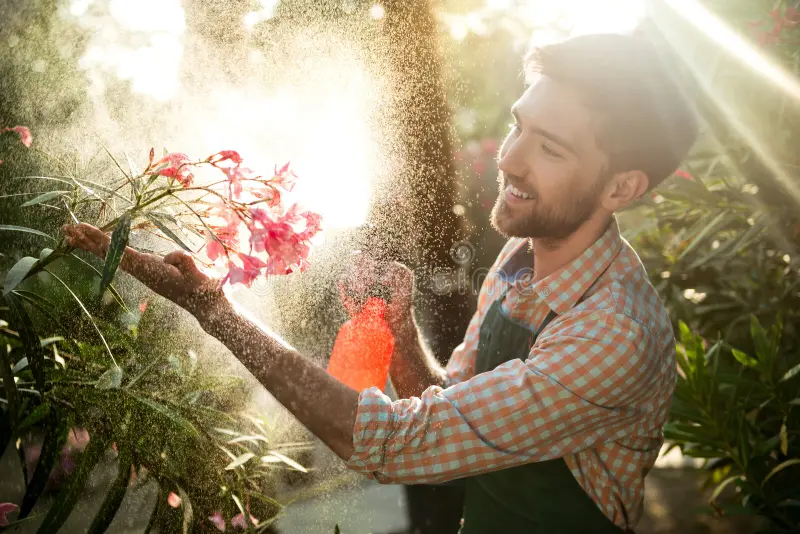Today post is related the How to Protect Your Garden. A garden is a place of tranquillity, beauty, and sometimes even hard work, but protecting it from external threats is essential for ensuring its health and longevity. Whether you’re dealing with pests, unpredictable weather, or soil depletion, there are various strategies to safeguard your plants and ensure they thrive. In this article, we’ll explore some effective ways to protect your garden, helping you create a flourishing environment for your plants.
Table of Contents
Toggle1. Protecting Your Garden from Pests
Pests are one of the most common threats to gardens. They can damage plants by feeding on them or spreading diseases. Fortunately, there are many ways to protect your garden from pests without resorting to harmful chemicals.
Use Natural Pest Control Methods
- Beneficial Insects: Encourage the presence of beneficial insects like ladybugs, lacewings, and predatory beetles, which feed on harmful pests such as aphids and mites. You can purchase these insects online or at garden centers and release them into your garden.
- Neem Oil: Neem oil is a natural insecticide that’s effective against a wide range of pests. It’s non-toxic to humans, pets, and beneficial insects, making it a safe choice for organic gardening.
- Diatomaceous Earth: Diatomaceous earth is a fine powder made from the fossilized remains of algae. It works by dehydrating and killing insects with exoskeletons, such as slugs, snails, and ants. Dust it lightly around the base of plants or over leaves to deter pests.
- Companion Planting: Some plants naturally repel pests. For example, marigolds repel nematodes and aphids, while basil can deter mosquitoes and flies. Planting these alongside vulnerable plants can act as a natural pest barrier.
Search More Related the How to Protect Your Garden
Read More A Comprehensive Guide for Thriving Greenery
Physical Barriers
- Netting and Row Covers: For more significant pests, such as birds or larger insects, use netting or row covers. These physical barriers allow sunlight and water to reach plants while preventing pests from attacking.
- Copper Tape: Slugs and snails dislike copper, so placing copper tape around plant pots or the edges of garden beds can prevent them from reaching your plants.
2. Protecting Your Garden from Extreme Weather
Unpredictable weather patterns, such as heavy rain, frost, or strong winds, can severely damage your plants. Here are some strategies to shield your garden from extreme weather conditions:
Create Windbreaks
Wind can break delicate plants and dry out soil. To prevent damage from strong winds, consider creating a windbreak using fences, hedges, or even temporary barriers made of burlap or mesh. Windbreaks can reduce wind speed and protect your plants from desiccation and physical harm.
Cover Plants During Frost
Frost can damage or kill tender plants, especially during the colder months. Use frost covers or old bedsheets to cover plants overnight when frost is expected. These covers trap heat and prevent frost from settling on the leaves. Alternatively, you can use cloches (small, portable greenhouses) to shield individual plants or create larger protective structures over your garden beds.
Mulch to Retain Moisture and Insulate Roots
Mulch serves a dual purpose in protecting your garden. It retains moisture during dry periods and helps insulate the soil during cold weather. Mulch made of wood chips, straw, or leaves can protect plant roots from temperature fluctuations, keeping them cool in the summer and warm in the winter.
3. Soil Protection and Improvement
Healthy soil is essential for strong, productive plants. Protecting the soil’s integrity is just as important as safeguarding the plants themselves.
Avoid Over-Tilling
Over-tilling the soil can disrupt soil structure, damage beneficial organisms, and lead to erosion. Instead, practice minimal tilling or no-till gardening to preserve the soil’s natural structure and reduce disturbance to microorganisms that help plants grow.
Cover Crops
Planting cover crops, such as clover, vetch, or rye, during the off-season helps prevent soil erosion and adds organic matter back into the soil. These crops also improve soil health by enriching it with nutrients and providing a habitat for beneficial insects.
Compost Regularly
Composting is an excellent way to recycle garden waste and enrich the soil. Compost improves soil fertility, enhances drainage, and helps retain moisture. Adding compost to your garden will provide a continuous supply of nutrients for your plants, reducing the need for chemical fertilizers and helping to protect the soil’s natural ecosystem.
4. Preventing Weeds
Weeds compete with your plants for nutrients, water, and sunlight. They can quickly overrun your garden and hinder your plants’ growth. Here are some ways to control weeds:
Mulch Heavily
As mentioned earlier, mulch acts as a protective layer for your plants and helps prevent weed growth. Apply a thick layer of mulch around the base of your plants to block sunlight from reaching weed seeds and prevent them from sprouting.
Weed Early and Often
The earlier you remove weeds, the easier it will be to manage them. Regularly check your garden for emerging weeds, especially after rainfall, and pull them out by hand or use a weeding tool. Be sure to remove the entire root to prevent regrowth.
Landscape Fabric
For larger garden areas or flower beds, you may want to install landscape fabric beneath your mulch. The fabric acts as a barrier that prevents weeds from pushing through while still allowing water and nutrients to reach the soil.
5. Animal Protection for Your Garden
Animals, both wild and domesticated, can wreak havoc on your garden. Deer, rabbits, squirrels, and pets like dogs or cats can dig up plants, eat flowers, or trample through your beds. Here are some ways to deter these unwanted visitors:
Fencing
A sturdy fence is one of the most effective ways to protect your garden from larger animals. Make sure the fence is high enough (at least 4–5 feet) to keep deer out, and bury the bottom into the ground to prevent animals like rabbits from burrowing under. You can also consider a mesh or wire fence for smaller pests.
Scare Tactics
Some gardeners use scare tactics to keep animals at bay. Motion-activated sprinklers can startle animals and send them running when they approach your garden. Reflective objects like aluminum foil strips or scarecrows can also deter animals, especially birds.
Pet Deterrents
If pets are a problem, try using pet-safe repellents or sprinkling cayenne pepper or coffee grounds around your plants. These strong scents are unpleasant to many animals and can discourage them from entering your garden.
6. Regular Monitoring and Maintenance
The best way to protect your garden is by regularly checking on your plants. Look for signs of pests, disease, or damage, and take action immediately if you notice anything unusual. Regularly deadhead flowers, trim overgrown plants, and maintain your garden tools to ensure everything is in top shape.





